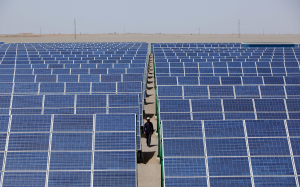Government plans roadmap for coconut-based biojet fuel
The Indonesian government is currently developing a roadmap for the utilization of coconut oil as a feedstock for the production of biojet fuel.
Dida Gardera, Deputy for Coordination of Food and Agribusiness at the Coordinating Ministry for Economic Affairs, mentioned that coconut has emerged as a potential commodity for research and further development into bioenergy.
"A roadmap is currently ongoing. Once it is nearly 100 percent complete, we will communicate it," stated Dida at the Coordinating Ministry for Economic Affairs office, on March 7, 2024.
According to Dida, the coconut has been identified as having the potential to be processed into biojet fuel. In every coconut tree, about 20-30 percent of coconuts are unsuitable for consumption. These rejected coconuts can be utilized to produce biojet fuel.
"It turns out there is potential in coconuts, especially rejected coconuts," he remarked.
Dida emphasized the importance of continuing to support and develop such energy innovations. The processing of coconuts into biojet fuel is preferably carried out domestically.
"If we look at coconut cultivation, it is already very good. We export coconuts, but currently only the coconut kernels are exported," said Dida.
Biojet fuel is a type of aviation fuel made from a blend of traditional jet fuel (Avtur) and other bio-based fuels. Currently, biojet fuel is produced using Avtur and palm oil.
Biojet fuel is considered a sustainable aviation fuel that can reduce carbon emissions in the transportation sector.
Acting Director General of New and Renewable Energy and Energy Conservation (EBTKE) at the Ministry of Energy and Mineral Resources (ESDM), Jisman P. Hutajulu, previously stated that bioenergy plays a crucial role in achieving the target of net-zero emissions (NZE) by 2060.
The contribution of the renewable energy sector to the national energy mix is 13.2 percent, with bioenergy contributing 7.7 percent or 60 percent of the total energy mix.
According to IEA data, during the period 2019-2021, ethanol, a liquid fuel made from sugar cane or starch crops like cassava, wheat, and sorghum, had the highest global demand among green fuels.
In contrast, the global demand for biodiesel and renewable diesel, as seen in the graph, was lower.
Tag
Already have an account? Sign In
-
Start reading
Freemium
-
Monthly Subscription
20% OFF$29.75
$37.19/MonthCancel anytime
This offer is open to all new subscribers!
Subscribe now -
Yearly Subscription
33% OFF$228.13
$340.5/YearCancel anytime
This offer is open to all new subscribers!
Subscribe now







